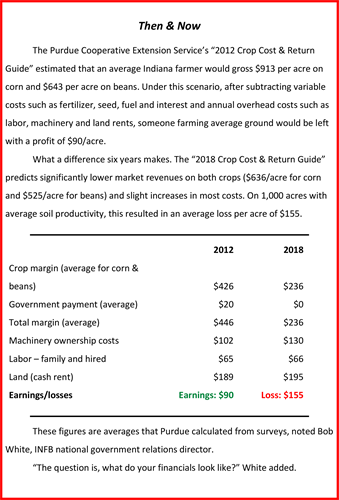Stay Informed
Difficult farm economy highlights importance of farm bill, trade
 There are aspects of the current farm economy that are making some observers uneasy. Bob White, INFB national government relations director, said some of the factors that are causing this concern are:
There are aspects of the current farm economy that are making some observers uneasy. Bob White, INFB national government relations director, said some of the factors that are causing this concern are:
- Net farm income is forecast to decrease by $4.3 billion (6.7 percent) from 2017 to 2018, according to the U.S. Department of Agriculture’s Economic Research Service. This would represent the lowest net farm income level in nominal dollar terms since 2006 and the lowest in real dollar terms since 2002. What is keeping many of these households afloat, the ERS noted, is off-farm income.
- Since 2013, net farm income has declined by 52 percent, and in 2018 it is projected to hit a 12-year low, according to the American Farm Bureau Federation’s economic team.
- One in 10 farmers is highly or extremely leveraged with loans that must be repaid. A majority of family farms must borrow prior to each season in hopes that they will harvest a profitable crop or raise profitable livestock, AFBF said.
- Caseload statistics from the United States Courts (a general name for the federal court system) indicate that for the three-month period ended March 31, there were 116 Chapter 12 bankruptcy filings, which are bankruptcies designed for family farmers or family fishermen. While down slightly from the first quarter of 2017, the March data highlights the tough financial conditions across much of rural America, AFBF’s economic team noted. Since 2014, farm bankruptcies have increased nearly 100 percent nationwide, and in Indiana, Illinois and Wisconsin, bankruptcies are up 108 percent.
In an effort to improve the economic situation, Farm Bureau is concentrating on three general strategies, White said.
“First, we’re working to get a good farm bill passed, one that includes a viable crop insurance program and other risk-management programs,” he said.
Opening up foreign markets is another of Farm Bureau’s priorities because trade has such a significant impact on commodity prices.
Farm Bureau also is working to keep the Indiana congressional delegation informed of the current state of agriculture, White said.
Farm Bureau members can help with all of these efforts by using their influence as voters.
“Lobby Congress and the administration for a good farm bill, particularly one that protects the crop insurance program, and also for more free and open trade,” White said.
On a personal level, White asked farmers to keep careful track of their own financial status – and to use their native ingenuity to find innovative systems and business opportunities that will help keep their businesses profitable even under trying conditions.




